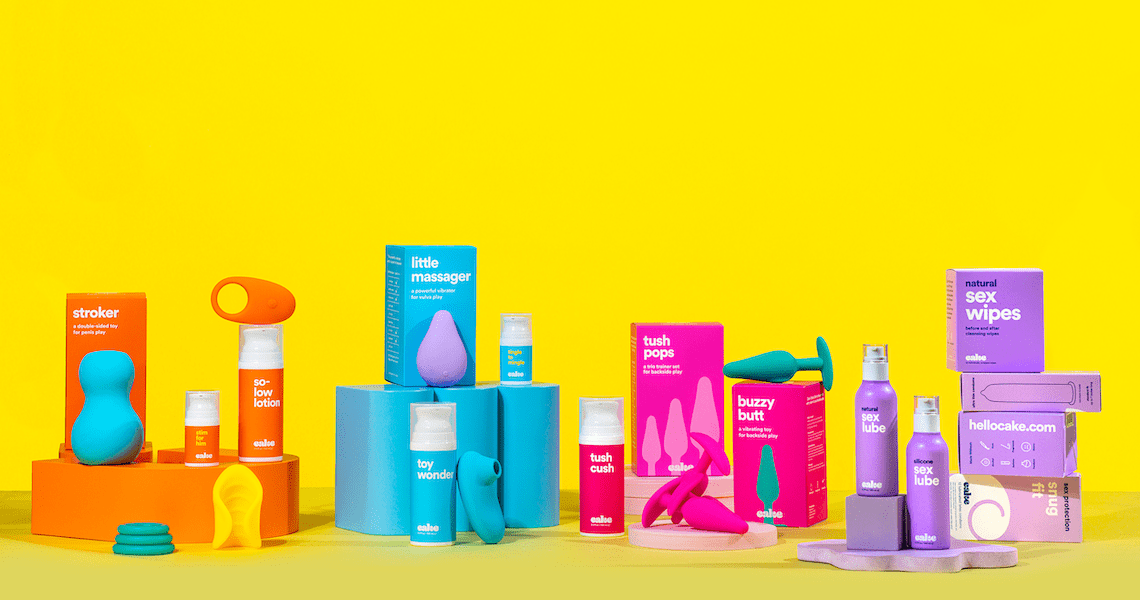On Tuesday, sexual wellness brand Cake raised $8 million in a Series A funding round, bringing its total funding to over $16 million.
Cake is sold via Walmart and Target and expanded to CVS this week with four products, including a lubricant dubbed Tush Cush and a penis massager called Stroker. Cake grew its sales by 200% year-over-year in 2022, according to the brand. Investors include Lerer Hippear, Silas Capital, Bullish, Selva Ventures and Finn Capital Partners. VC firm Lerer Hippeau has made a name for itself by investing in digitally-native consumer brands like Glossier and Warby Parker. Its investment in Cake gives the startup a stamp of approval, putting it in the category with a generation-defining cohort of brands.
Glossy spoke with Caitlin Strandberg, a partner at Lerer Hippeau, to talk about the firm’s investment in DTC brands, why Cake was a sound bet and what businesses need to do during a recession. Below are excerpts that have been lightly edited and condensed for clarity.
Lerer Hippeau is well known for investing in DTC brands like Glossier and Casper; what is your position on DTC today?
“The world views us more as consumer investors versus direct-to-consumer; we have a fantastic consumer portfolio, as well as enterprise … Direct-to-consumer had its moment over the last 10 years, and a lot of great companies were made, but now we’re seeing a shift back to omnichannel. It’s safe to say that DTC is a channel that most companies should use and master. However, they must diversify those channels. We’re looking for digitally-native brands with an omnichannel approach right out of the gate. The beginning of the millennial market was in 2010. Now we’re looking at what millennials continue to do, [but also] what Gen Z is starting to do when it comes to consumer shopping.”
What interested Lerer Hippeau in investing in Cake?
“It was obvious the Cake founders were onto something, from a brand mission perspective, but also from some early [business] validation they had. The founders, Hunter Morris and Mitch Orkis, are a unique and special blend of analytical rigor you need for wholesale and retail execution, [and had an idea for strong] brand DNA. It was clear when we first met that they already built a fantastic brand, in terms of coloring and [market copy]. On top of that, they built this thoughtful product system. It was organized, the products made sense, you could see how it was bundled, you could see how it worked as a system. They built a sex care system based on anatomy, not gender. Most importantly, they have a voice that speaks authentically to modern consumers. But to the validation point, they had a purchase order from a major retailer to carry a handful of their products. And [sex products] are tough to sell to retailers in a world where sexual wellness is known as being a tricky topic to invest in.”
What’s been one of the biggest learning experiences regarding VC investments?
“An investing truth that sometimes people deviate from is that investing at the seed or early stage is always about the team. You’re always looking for thoughtful, strategic and coachable founders. They’re thinking further into the future than we are and can navigate company’s good, bad and ugly. As an investor, you can get really excited about a product or a market, but ultimately, the founder is the most important steward of the business.”
What’s the biggest headwind for consumer brands in the next one to two years?
“Whenever you’re in a recessionary environment, founders need to focus on discipline and preserving options of what they can do in the future. That means cutting unnecessary costs, re-forecasting [sales], tightening up marketing spending and weathering through the storm over the next 12 to 24 months. In the case of Cake, they did a fantastic job from Seed to Series A on delivering on everything they said they would and have been thoughtful about retail expansion and distribution. They focus on one retailer and do it incredibly well before expanding to the next.”




